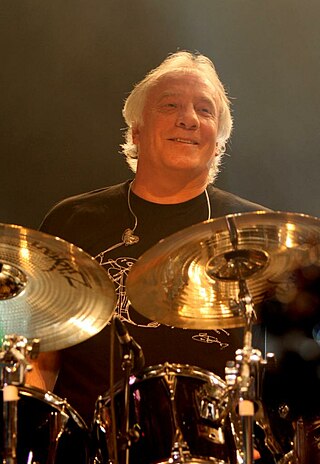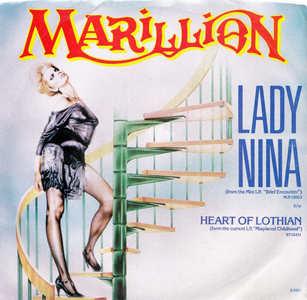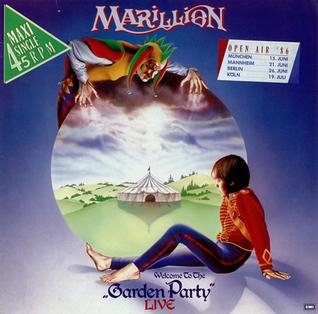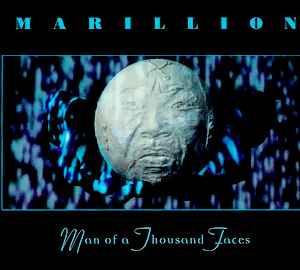
Ian F. Mosley is an English drummer. He is best known for his long-time membership of the neo-prog band Marillion, which he joined for their second album, Fugazi, released in 1984. He had previously been an in-demand session drummer. Mosley's abilities have been widely praised, including by former Genesis guitarist Steve Hackett, Meshuggah drummer Tomas Haake and critic John Franck of AllMusic. Modern Drummer has characterised him as a "drumming great".

Brave is the seventh studio album by Marillion, released in 1994. It charted at number 10 on the UK Albums Chart, being the last of the band's albums to reach the Top 10 in the United Kingdom until F E A R reached number 4 in 2016. The album is ranked at #29 on Prog Magazine's "Top 100 Prog Albums of All Time."

Steven Rothery is an English musician who is the original guitarist and the longest continuous member of the progressive rock band Marillion. Outside Marillion, Rothery has recorded two albums as part of the duo The Wishing Tree and an instrumental solo album, The Ghosts of Pripyat, released in September 2014. He also founded the British Guitar Academy in 2011.

Seasons End is the fifth studio album by British neo-prog band Marillion, released in 1989. The album was the first to feature current lead vocalist Steve Hogarth, following the departure of former vocalist Fish in late 1988. It reached number 7 on the UK Albums Chart.

Afraid of Sunlight is Marillion's eighth studio album, released in 1995. It was their last for EMI.

The Best of Both Worlds is a two-disc compilation album by British neo-prog band Marillion released in 1997 by EMI Records, who the band had been signed to from their debut in 1982 until being dropped in 1995. The title refers to Marillion's two distinct "eras" with lead singers Fish (1980–1988) and Steve Hogarth. By the time this compilation was released, both line-ups had recorded four studio albums each.

Radiation is the tenth studio album by the British neo-prog band Marillion, released in 1998. Recorded at The Racket Club between November 1997 and June 1998, it was co-produced and mixed by Stewart Every. The album was remixed by Michael Hunter in September to November 2012 and a reissued remastered version was released in 2013.

John Wesley Dearth III is an American guitarist and singer, best known as touring guitarist for Porcupine Tree between 2002 and 2010, and also for performing with Mike Tramp, Fish, Sound of Contact, Edison's Children and Vertical Horizon, as well as for his solo work.

"Assassing" is a song by the British neo-prog band Marillion. It was the second single from their second studio album, Fugazi (1984). The single reached no. 22 on the UK singles charts in May 1984. The 7" single's title track is a heavily edited version of the first track on Fugazi, with a length of 03:39 as opposed to the album version with 07:01. The B-side is the non-album track "Cinderella Search".

Bouillabaisse is a compilation double album by Fish released in 2005. It is the third "best-of" collection after Yin and Yang (1995) and Kettle of Fish (1998), however, it covers Fish's entire solo career up to the previous year's studio album Field of Crows. The songs are divided into two sets: Disc 1, entitled "Balladeer", and disc 2, entitled "Rocketeer". It also features the single edits Marillion's three biggest hits, "Kayleigh", "Lavender" (1985) and "Incommunicado" (1987). It also features an edited version of "Goldfish and Clowns" from Sunsets on Empire (1997) which has never been released due to the planned single being ultimately cancelled.

Anorak in the UK is a live album by Marillion released in April 2002 and documenting the previous year's Anoraknophobia tour. Most songs were recorded on three nights in May 2001 using a mobile studio, while two tracks were recorded in front of a small private audience at the band's own studio after the October leg of the tour. The album was released in two versions: A two-disc set only distributed via Marillion's own mail-order business, and a one-disc retail edition distributed by EMI. Under this deal, EMI required the band to provide one exclusive song on the retail edition that would not be found on the two-disc version. The band chose "Easter" from 1989, as it is available on several previous official and semi-official live albums and therefore would not "force" fans to purchase both versions of the album. Anorak in the UK is Marillion's first official retail live album since Made Again (1996), and the second with Steve Hogarth. The title takes its cues from the Sex Pistols single "Anarchy in the U.K." and, self-mockingly, the British slang term anorak often applied to Marillion fans. The cover shows a crowd consisting of "Barry" featured on Anoraknophobia.

The Best of Marillion is a compilation album from the band Marillion. The songs come from both the Fish era and Steve Hogarth era of the band. It was released in mainland Europe only.

"Lady Nina" is a song by the British neo-prog band Marillion. First released in 1985 on the B-side to the #2 UK hit single "Kayleigh", it was the only single from the EP Brief Encounter released in the United States by Capitol Records in April 1986. A music video was also shot to promote it. While the EP climbed to #67 on the Billboard 200 album charts, "Lady Nina" did not make the Billboard Hot 100, but did reach #30 on the Mainstream Rock charts.

"Heart of Lothian" is a song by British neo-prog band Marillion. It is the fifth track on the 1985 concept album Misplaced Childhood. The song was released as the third single from Misplaced Childhood on 18 November 1985 in the UK, the Netherlands, West Germany, Canada, South Africa and Australia. "Heart of Lothian" became the third Top 30 UK single from Misplaced Childhood, peaking at number 29. The song also peaked at number 51 on the German singles chart.

"Welcome to the ‚Garden Party‘" is a 1986 single by British neo-prog band Marillion released exclusively in West Germany to accompany a series of concerts the band played at festivals in that country as second bill to Queen, following their commercial breakthrough with the album Misplaced Childhood and the hit singles "Kayleigh" and "Lavender" the year before. The single was released on 7" and 12" vinyl; neither version contained any new or previously unreleased material. The 7" and 12" versions contained completely different recordings from each other. The A-side, "Garden Party", originally the second single from the band's debut album, Script for a Jester's Tear, had reached #16 on the UK Singles Chart in 1983, but—like all Marillion singles before "Kayleigh"—had failed to chart in Germany. However, the single received little airplay and failed to enter the German top 100.

Easter is a song from English neo-prog band Marillion's 1989 album Seasons End, which became a UK Top 40 hit when issued as a single in 1990. Allmusic describe the song as "heartfelt" with an "imaginative electric-acoustic arrangement". As with many Marillion songs, the album version features an extended guitar solo by Steve Rothery, which has become a fan-favourite, although it is heavily edited for the single version. The song was written by singer Steve Hogarth before he joined the band in 1989 and was inspired by The Troubles in Northern Ireland. The title is in reference to Easter 1916 by William Butler Yeats. Portions of the video were filmed on the Giants Causeway.

Edison's Children is a science fiction-oriented progressive rock trio known for writing "epic Concept albums" with supernatural, apocalyptic and extra-terrestrial themes. It features Rick Armstrong, Pete Trewavas and Eric Blackwood. Their CDs include visual accompaniments in the form of 20 page "lyrics and images" insert booklets by photographer Wendy Darling Blackwood.

"Warm Wet Circles" is a song by the British neo-prog band Marillion. It was the third single from their fourth studio album Clutching at Straws, released on 26 October 1987.

Fuck Everyone and Run (F E A R) is the eighteenth studio album by the British neo-prog band Marillion, released in 2016.

"Man of a Thousand Faces" is the lead single from British neo-prog band Marillion's ninth studio album This Strange Engine, released on 2 June 1997 by Castle Communications imprint Raw Power. It was the band's first single since they departed from EMI Records in 1995. Reflecting the decline in popularity for Marillion, the song reached only the number 98 on the UK Singles Chart. A music video was created for "Man of a Thousand Faces".




















